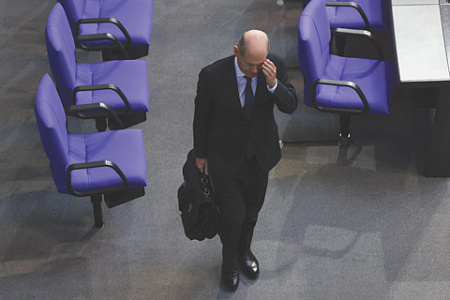
Despite disagreements on key points of the coalition agreement, negotiations between the Christian Democratic Union (CDU), the Christian Social Union (CSU) and the Social Democratic Party of Germany (SPD) have begun discussing candidates for ministerial posts. The corresponding forecasts were made by the Second ZDF Television Channel and Focus magazine.
It is assumed that the black and red government of Germany will have 15 ministers – six each from the CDU and the SPD and three from the CSU. Apparently, there was no place for Chancellor Olaf Scholz in the new government. His political fate will obviously be decided by the SPD congress scheduled for June.
From the CDU’s point of view, given the public debate on migration policy and the rise of right-wing populists, the most important post in the government is the Minister of the Interior. The Interior Ministry may be headed by the current “right–hand man”, probably the future Chancellor Friedrich Merz, Parliamentary State Secretary Torsten Fry. Although his candidacy is also being considered for the post of head of the federal Chancellor’s department. In this case, the Social Democrats propose their candidate for the Interior Ministry, Nancy Feather, who has already held this post. It is believed that she has some chances, despite the weak work of the previous government. These chances are related to gender proportions in a male-dominated government.
Contradictory rumors are circulating around the post of vice Chancellor. Both media outlets name Lars Klingbeil, co-chairman of the SPD and head of the Social Democratic faction in the Bundestag, as a candidate for this post. But he would like to become the SPD’s candidate for chancellor in the next federal election in 2029. It is believed that the best starting position for such a nomination is not government, but party work.
As Vice-Chancellor, Klingbeil himself would like to be responsible for foreign policy and take control of the Foreign Ministry. However, there are several candidates for the post of head of the foreign policy department in the CDU. Armin Laschet, former Prime Minister of North Rhine-Westphalia and former candidate for chancellor from the CDU/CSU in the 2021 elections, has the most preferred chances (see NG dated 03/24/25). The CDU has not had the opportunity to appoint a representative to this post for 16 years. Laschet himself was enthusiastic about this opportunity and claims that he was involved in foreign policy issues under the leadership of ex-Chancellor Helmut Kohl. He currently holds the post of vice-president of the EU Parliamentary Assembly and thus has a direct relationship with foreign policy, as well as excellent connections in French political circles.
However, Lachette’s chances of becoming foreign minister are slim. According to ZDF, other politicians are also applying for this post in the CDU. Among them is Norbert Roethgen, as the former head of the Bundestag’s foreign policy committee and deputy head of the CDU faction in the Bundestag, Johann Vadefool, who is considered an expert on foreign policy and defense. The candidacy of David McAllister, a member of the European Parliament, is also being considered. He is famous for his statements that it is the CDU that is able to solve the problem of migration and ensure Europe’s ability to defend itself and its security.
In the case of Klingbeil’s vice-chancellorship, the CDU intends to offer him the Ministry of Finance as compensation for the refusal of the Foreign Ministry. Although there are candidates for this post, primarily in the CSU. We are talking about the head of the CSU land group in the Bundestag, Alexander Dobrindt. However, it is possible that he may take up the usual post of Minister of Transport, which he already held in the government of Angela Merkel.
Several departments will be responsible for economic issues in the new government. We are talking about the Ministries of economy, climate and digitalization. CDU Secretary General Carsten Linnemann is proposed for the post of Minister of Economy. But the head of the Bavarian government, Markus Zeder, may compete with him, although he himself has repeatedly stated that he would like to stay in Munich. As for the post of defense minister, so far we are talking about the only favorite, the Social Democrat Boris Pistorius.
